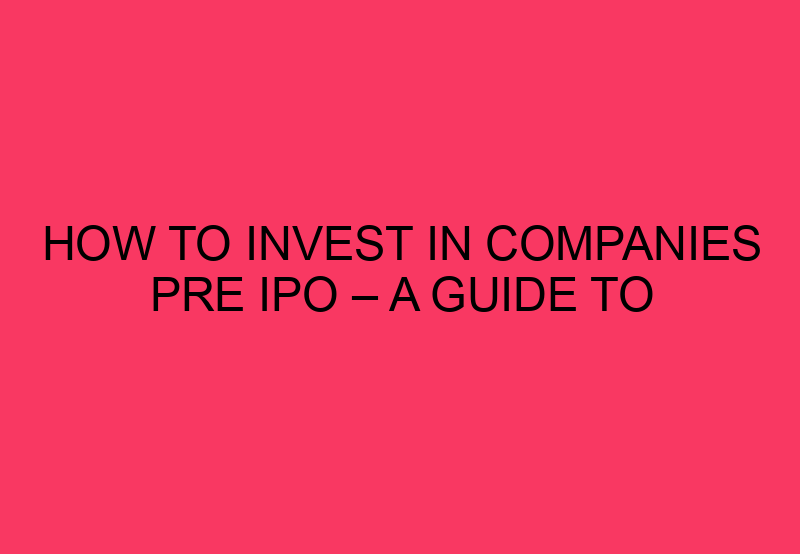Investing in companies pre IPO can be a smart move for those looking to get in on the ground floor of a promising new business venture. However, it’s important to approach pre IPO investing with caution and a solid strategy. In this guide, we’ll cover everything you need to know to make informed decisions when investing in pre IPO companies.
What is Pre IPO Investing?
Pre IPO investing, also known as pre market investing, is when investors purchase shares of a company before the company goes public. Essentially, these investors are getting in on the ground floor before the company hits the stock market and becomes available to the general public.
While investing in pre IPO companies can be riskier than investing in publicly traded companies, it can also offer the potential for greater returns. By investing early, you have the opportunity to buy in at a lower price and potentially see significant gains as the company grows and becomes successful.
How to Find Pre IPO Companies
Finding pre IPO companies to invest in can be challenging, as these businesses are typically not yet well known. However, there are a few strategies investors can use to uncover promising pre IPO companies.
One option is to work with a venture capital firm or angel investor network. These organizations specialize in early stage investing and often have access to a variety of pre IPO companies seeking funding.
Another option is to do your own research and look for companies that are in the process of preparing for an IPO. Look for news stories or press releases that mention a company’s plans to go public in the near future. This can be a good indicator that the company may be open to pre IPO investments.
How to Evaluate Pre IPO Companies
Before investing in a pre IPO company, it’s important to do your due diligence and thoroughly evaluate the business. Here are a few key factors to consider:
– Revenue and profitability: Look at the company’s financials to determine if they are generating revenue and turning a profit. This is a good indicator of the company’s overall health and potential for growth.
– Market size and competition: Evaluate the size of the company’s target market and the level of competition in that space. Ideally, you want to invest in a company that has the potential to dominate its market.
– Management team: Look at the experience and track record of the company’s leadership team. A strong, experienced team is more likely to be successful in growing the business.
– Growth potential: Consider the company’s potential for growth in the future. Are they in a growing industry? Do they have a unique product or service that could disrupt the market?
How to Invest in Pre IPO Companies
Once you’ve found a pre IPO company that you’re interested in investing in and evaluated it thoroughly, it’s time to make your investment. Here are a few ways to invest in pre IPO companies:
– Work with a broker: Some brokers offer access to pre IPO shares for accredited investors. This can be a convenient way to invest in pre IPO companies, but it’s important to ensure that you’re working with a reputable broker.
– Investing in a venture capital fund: Another option is to invest in a venture capital fund that specializes in pre IPO investments. This can give you exposure to a variety of pre IPO companies and offer the potential for diversification.
– Direct investment: If you have a close relationship with the company or its founders, you may be able to make a direct investment in the business. However, this is a riskier option and should be approached with caution.
Risks of Pre IPO Investing
While pre IPO investing can offer the potential for high returns, it’s important to be aware of the risks involved. Here are a few key risks to consider:
– Limited information: Unlike publicly traded companies that are required to disclose a great deal of information, pre IPO companies may not provide as much information to investors. This can make it difficult to fully evaluate the investment opportunity.
– Liquidity risk: Pre IPO investments are typically illiquid, meaning it can be difficult to sell your shares if you need to liquidate your investment. This can tie up your money for an extended period of time.
– High risk: Pre IPO companies are often in the early stages of development and may not have proven their business model or generated significant revenue yet. This makes them inherently riskier than established, publicly traded companies.
Conclusion
Investing in pre IPO companies can be a viable strategy for those looking to invest in early stage businesses with high growth potential. However, it’s important to do your due diligence and evaluate pre IPO investments carefully before committing your money. With a solid strategy and careful consideration, pre IPO investing can offer the potential for significant returns.
